|
 |
 |
Group of Seven intervenes
Econoday International
Perspectives 9/25/00
By Anne D. Picker, International Economist |
Euro floors, Oil ceilings
(Anne Picker will be on vacation Oct. 2, her next 'International Perspective' column will be Oct. 9)
The euro and available crude oil supplies dominated equity and currency markets last week. The euro finally caught the equity markets' attention as the currency sank going into the Group of Seven finance ministers' meeting in Prague. The weekend meeting came amid a host of high profile earnings warnings from multinationals which complained about the unfavorable exchange rate between the U.S. dollar and the euro. When companies repatriated earnings in anticipation of the third quarter close, those with large European exposures were hurt. And Intel's profit warning late Thursday, citing weak European sales, ricocheted through the world's equities markets making a bad week worse for investors.
Crude oil prices continued to rise despite OPEC's decision two weeks ago to produce more crude. Markets finally paid attention to climbing energy prices and the sinking euro as these factors begin to impact corporate profits. Energy prices have raised costs but have not been passed through to the consumer, as strong global competition has forced corporations to squeeze their bottom lines instead. Inflation fears came to the fore in Europe, where the diving euro has compounded the pressure from oil, which is priced in U.S. dollars.
However, on a pre-Group of Seven Friday when everyone expected a slow day, the markets took a one-two punch. Traders were rudely awakened about 7:15 am EDT. The central banks pounced on the currency markets, intervening on behalf of the euro. And immediately after the four o'clock U.S. markets' close, President Clinton agreed to release 30,000,000 barrels of crude from the strategic petroleum reserve to ease prices and the winter's possible fuel oil shortage. Friday ended with crude oil prices down and the euro up.
Equities markets however, took it on the chin. All indexes tracked here were down on the week. The U.S. Dow and the Nasdaq, however, fared best when compared with overseas markets and were down less than one percent. Only the Toronto Stock Exchange composite 300 (up 25.58 percent) and the Paris CAC (up 5.04 percent) are on the plus side when compared with the beginning of the year.
| Selected World Stock Market Indexes |
| |
Index
|
Sept 22
|
Sept 15
|
Percent
Change
|
| Asia |
|
|
|
|
| Australia |
All Ordinaries
|
3143
|
3281
|
-4.18
|
| Japan |
Nikkei 225
|
15818
|
16213
|
-2.44
|
| Hong Kong |
Hang Seng
|
14613
|
16250
|
-10.07
|
| S. Korea |
Kospi
|
553
|
628
|
-11.93
|
| Singapore |
Sing. Strait
|
1932.99
|
2054
|
-5.88
|
| |
|
|
|
|
| Europe |
|
|
|
|
| Britain |
FTSE 100
|
6206
|
6417
|
-3.29
|
| France |
CAC
|
6259
|
6615
|
-5.38
|
| Germany |
DAX
|
6740
|
7000
|
-3.70
|
| |
|
|
|
|
| North America |
|
|
|
|
| United States |
Dow
|
10847
|
10927
|
-0.73
|
| |
Nasdaq
|
3804
|
3835
|
-0.82
|
| Canada |
TSE Composite
|
10566
|
11064
|
-4.50
|
| Mexico |
Bolsa
|
6550
|
6835
|
-4.18
|
| |
|
|
|
|
| |
|
|
|
|
South Korean and Hong Kong markets were closed on Wednesday.
Japanese markets were closed on Friday.
Britain and Europe
It was a bad week for most stock indexes. Investors continued to fret as more companies confessed to lower than expected profits, especially in the glamorous technology/media/telecommunications sector. This sent investors scurrying out of the TMT stocks. Interest rate worries and their impact on growth also intruded. In Britain, the Bank of England monetary policy committee September 6 and 7 meeting minutes showed continuation of the 4 to 3 split on interest rates. And even though rates remained on hold, this implied that rates still could go up by the end of the year. Soaring crude oil prices and the sinking euro didn't help equities either.
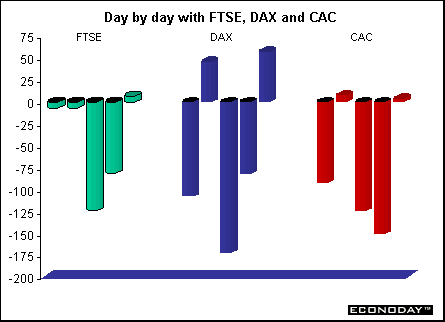
In Europe, disappointing economic data from Germany and Italy brought the vitality of the EMU expansion into question. This only helped push the euro to new record lows. Major European stock indexes fell led by the TMTs amid fears that continental economic growth may have peaked. With oil prices still near ten year highs, there is concern about a possible economic slowdown in Europe in 2001, and people are taking their money out of the market.
When it was all over, the equities markets managed to pick up the pieces Friday after the central banks' intervention and close trading on a barely positive note. However, on the week all three indexes were down. The London FTSE 100 sank 211.4 points or 3.29 percent to end the week at 6205.9. The Paris CAC was down 356.07 points or 5.38 percent at 6258.58, while the Frankfurt DAX was down 259.29 points or 3.7 percent at 6740.25.
Asia
Asia's equities were hit by downdrafts also. Asian stock markets have fallen sharply partly because of concerns that soaring oil prices will dent corporate profits, fuel inflation, force interest rates up and curb growth. Continued worries about chip prices and demand also haunted Asian investors and were exacerbated by Intel's warning. In South Korea, shares spiraled downward as the Kospi was hit by Ford's withdrawal from the Daewoo auto deal and by rough sailing for banking sector restructuring. The Kospi plummeted to a new low 553.25. It was down 74.95 points or 11.93 percent.
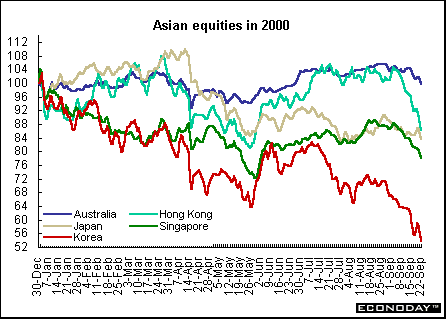
In Japan, there is yet a new government spending package to stimulate growth. However, the Nikkei 225 continued its recent slide and closed below 16,000 at 15,818.25. The index lost 395.03 points or 2.44 percent. Continuing on with the bad news, the Hong Kong Hang Seng plummeted 1636.65 points or 10.07 percent to end the week at 14,612.88. The Hang Seng lost 1,026 points or 5.94 percent the previous week.
The euro gets attention...
The central banks caught the currency market unawares Friday morning and intervened on behalf of the beleaguered euro. The European Central Bank, Bank of Japan, Bank of England, Bank of Canada and the United States Treasury all purchased euros to boost the currency's value. The Bundesbank and Bank of France also participated. The euro initially soared over $0.90 at 7:15 am EDT, but slid back gradually during the U.S. trading session to close at $0.8780. The markets were looking to the Group of Seven finance ministers' meeting in Prague for a statement supporting the euro, and had decided there would probably be no intervention before the weekend.
The urgency of the falling euro was brought home as companies began to give third quarter profit warnings. The reason for not meeting expectations was that the euro had finally eaten into earnings repatriated from the EMU countries. Inflationary pressures within Europe were rising and threatening growth there. Crude oil price increases in Europe were doubly felt because of the sinking euro.
During the past several weeks, the euro continually set new lows. Analysts think that the motivation for the intervention was to put a viable floor under the euro while not upsetting the United States' strong dollar policy just before the presidential election.
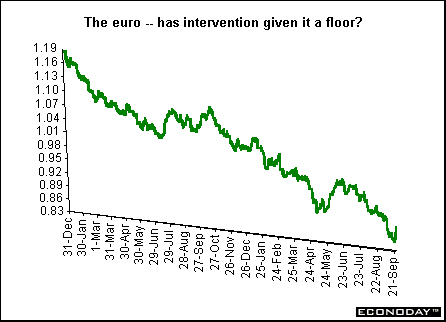
Crude oil prices rise...
Crude oil prices continued to rise last week in the face of continued OPEC output. The oil producing cartel announced an 800,000 barrel per day increase two weeks ago. However, they were already producing about 600,000 barrels under the table. But it wasn't until Thursday, and the likelihood that the United States would use some crude oil from its strategic petroleum reserve, that prices began to ease. The impact of the 30,000,000 barrel release on prices won't be known until trading begins this week, but it should put a ceiling on oil prices by adding to crude supply.
The G-7 finance ministers also put pressure on OPEC when they expressed concern about the adverse impact of oil prices on world economies, which have tripled since February 16, 1999 (see graph below). However, OPEC's secretary general says that the world oil market is held captive by the derivatives markets and that the old rules of supply and demand have been distorted by the creation of what he calls "paper barrels" of oil. OPEC estimates that at least $8 of the oil price is due to speculation.
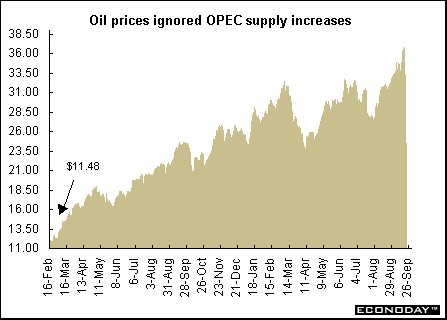
Indicator scoreboard
EMU - August harmonized index of consumer prices was unchanged as a drop in motor fuel prices offset a rise in heating oil prices. When compared to last year, the HICP slipped to 2.3 percent from 2.4 percent in July. This is still above the European Central Bank's two percent inflation target. Core inflation (excluding energy, food, alcohol and tobacco) remained tame, rising only 0.1 percent on the month and 1.3 percent on the year for the third month in a row.
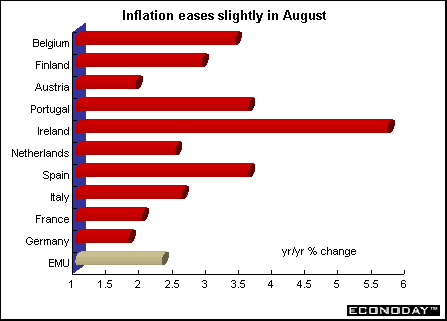
Germany - July new construction industry orders were unchanged from the previous month, as orders in west Germany rose and those in the east plunged. Overall orders declined 13.1 percent from a year ago. Building orders advanced 4.2 in west Germany but were down a monthly 10.7 percent in east Germany.
July manufacturing orders were revised down to an increase of 0.2 percent in contrast to the 0.7 percent increase initially reported. Both domestic and foreign orders were revised down. While domestic orders were down 1.2 percent on the month, foreign orders rose 1.9 percent. Pan-German capital goods orders fell 2.3 percent while basic goods orders were up 0.9 percent. Consumer and durable goods orders were up 3.8 percent.
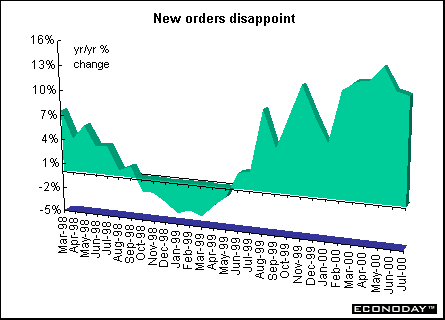
August Ifo Institute's west German business sentiment index slipped to 99.0 from 99.1 in July and 100.3 in June. This was the third month in a row that the index declined. The Ifo east German business sentiment index rose to 105.7 from 105.3 the month before. The current conditions index rose in both east and west Germany to 123.8 and 94.2 respectively. However, expectations in west Germany fell to 103.8 while in east Germany, they rose to 88.7.
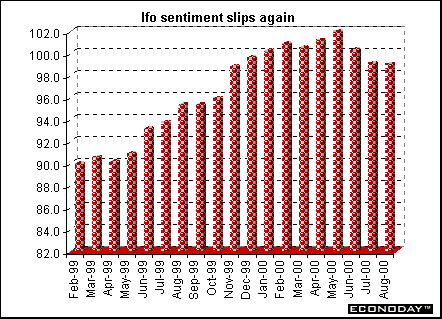
August producer prices rose 0.3 percent and 3.5 percent when compared with last year. The annual rate was at its highest level since April 1989. Excluding oil product prices, PPI was up 0.3 percent on the month and 2.5 percent on the year. Price pressures were confined to energy goods and other immediate goods, such as commodities. Producer prices for consumer and capital goods were little changed on the month. In August, oil products prices rose 0.7 percent on the month and 26.1 percent on the year.
Italy - Second quarter seasonally adjusted gross domestic product rose 0.3 percent from the previous quarter and 2.6 percent on the year. Net exports subtracted 0.8 percent from second quarter growth. Exports rose 1.8 percent on the quarter, while imports soared 5.1 percent. In the first half of the year, GDP rose 2.8 percent from the same period of 1999.
Asia
Japan - August merchandise trade surplus fell 2.7 percent and 11.8 percent on the year. The surplus with the United States continued to climb, rising 2.3 percent when compared with last year. Exports increased 12.5 percent on the year while imports climbed 18.1 percent. Exports to the United States grew 3.9 percent on the year while imports rose 5.3 percent. The trade surplus unexpectedly shrank in August because the cost of imported oil leaped 20 percent. This outweighed export gains. Oil imports were up 41.8 percent on year
July seasonally adjusted service industries output fell 1.1 percent signaling economic growth may slow in the third quarter. The decline in the so-called tertiary industry activity index measures output of estate agents, banks, insurers and other service companies. From a year earlier, the index rose 2.4 percent.
Americas
Canada - July manufacturers' shipments fell 1.3 percent led by declines in the motor vehicle and machinery industries. When compared with last year, shipments were 9.1 percent higher. Manufacturers' shipments decreased in 12 of the 22 major groups in July, representing 73.3 percent of the total value of shipments. Excluding the automotive sector, shipments declined 1.0 percent. Manufacturers' backlog of unfilled orders jumped 5.2 percent. The July increase in unfilled orders was dominated by a surge of orders in the aircraft and aircraft parts industry. Excluding the aircraft and parts industry, unfilled orders rose 2.1 percent in July.
July merchandise trade surplus slipped to C$4.2 billion, down C$924 million from record setting June level. Both exports and imports fell. Exports dropped 2.9 percent because of lower exports of passenger vehicles, communications equipment and crude petroleum. Imports dropped 0.4 percent because of declining imports of motor vehicle parts, industrial machinery used in the automobile industry and metal fabricated basic products. These declines were offset somewhat by higher imports of communications equipment. The trade balance for the first seven months of the year was C$28.9 billion, an increase of C$10.4 billion over the same period of 1999. Both imports and exports with the United States slipped, with exports down 2.3 percent while imports were down 1.6 percent.
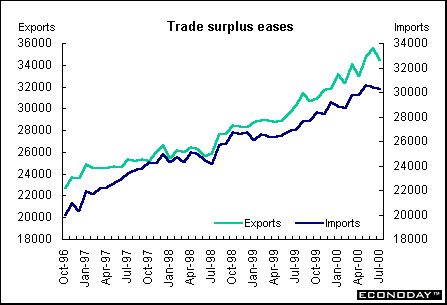
July retail sales were up 1.3 percent following gains of 1.1 percent in June and 0.6 percent in May. In constant dollars, retail sales were up 1.4 percent in July compared with June. Lower prices for motor vehicles in July partly offset the higher prices in most of the remaining retail sectors. All retail sectors contributed to the July increase in sales; the strongest gains were in the furniture, general merchandise and automotive sectors. When compared with last year, July retail sales were up 6.7 percent. Excluding motor and recreational vehicle dealers, sales rose 6.5 percent.
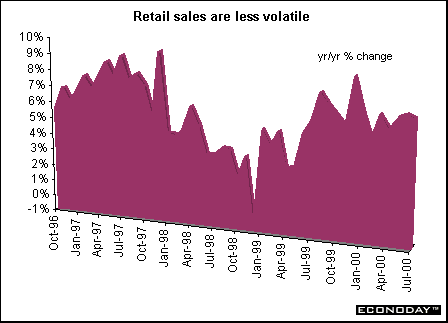
BOTTOM LINE
The reasons for the euro's steady decline since its inception in January 1999 are several. European investors have been on a buying spree in the United States, avidly pursuing companies and securities. The European economies have been severely outperformed by the United States for the last several years, making assets here look much more attractive to European investors. Analysts acknowledge that the euro may have been overvalued initially because of enthusiasm for the new currency and what it stood for, making a decline inevitable. Although the European Central Bank has been patterned after the Bundesbank, it did not carry with it the cache of the German central bank in the markets. The rhetoric from the various governments and agencies has, for the most part, been at cross-purposes, contradicting each other so that investors didn't know what to believe. And I could go on...
European manufacturers haven't minded the falling euro because it increased exports and provided a catalyst for economic growth. However, the ECB, with its focus on inflation, has become more uncomfortable as price increases become more prevalent. Crude oil is a much greater portion of EMU imports (and GDP) than in the United States, and therefore has put more pressure on prices. The impact has been much larger because, again, in addition to costing more, crude is priced in dollars, making it even more expensive in Europe. 'International Perspective' will return again on Oct. 9
Looking
Ahead: September 25 to September 29, 2000
|
| Other meetings |
|
|
| Sept 25 - 28 |
|
International Monetary Fund/World Bank annual meeting
Prague, Czech Republic |
| |
|
|
| The following indicators
will be released this week... |
| Europe |
|
|
| Sept. 25 |
Germany |
Consumer Price Index (September) |
| |
Britain |
Merchandise Trade (August, September) |
| Sept 26 |
Germany |
Import/Export Prices (August) |
| |
France |
Consumer Price Index (August) |
| |
Italy |
Unemployment (July) |
| Sept 27 |
Britain |
Gross Domestic Product (Q2, 2000) |
| |
|
Current Account Deficit (Q2, 2000) |
| Sept 28 |
EMU |
Industrial Production (July) |
| |
Italy |
Retail Sales (July) |
| Sept 29 |
EMU |
Merchandise Trade (June, July) |
| |
|
Labor Costs (Q2, 2000) |
| |
France |
Producer Price Index (July, August) |
| |
|
ILO Unemployment (August) |
| |
Italy |
Merchandise Trade (July, August) |
| |
Britain |
Nationwide House Price Index (September) |
| Sometime this week... |
| |
ECB |
M-3 Money Supply (August) |
| |
|
|
| Asia |
|
|
| Sept. 26 |
Homg Kong |
Merchandise Trade (August) |
| Sept. 27 |
Japan |
Industrial Production (August) |
| |
|
Retail Sales (August) |
| Sept. 29 |
Japan |
Consumer Prices (August, September) |
| |
|
Household Spending (August) |
| |
|
Unemployment (August) |
| |
|
Construction Orders (August) |
| |
|
Housing Starts (August) |
| |
Australia |
Merchandise Trade (August) |
| |
Hong Kong |
Industrial Production (Q2, 2000) |
| |
|
Producer Price Index (Q2, 2000) |
| |
|
|
| Americas |
|
|
| Sept. 27 |
Canada |
Employment and Earnings (July) |
| Sept. 28 |
Canada |
Industrial Product Price Index (August) |
| |
|
Raw Material Price Index (August) |
| Sept. 29 |
Canada |
Gross Domestic Product at Factor Cost (July) |
| |
|
|
| |
|
|
Looking
Ahead: October 2 to October 6, 2000
|
| Central
Bank Activities |
|
|
| October 3 |
U.S. |
Federal Reserve Open Market Committee Meeting |
| October 4,5 |
Britain |
Bank of England Monetary Policy Committee Meeting |
| October 5 |
EMU |
European Central Bank Monetary Policy Committee Meeting |
| |
|
|
| The following indicators
will be released this week... |
| Europe |
|
|
| October 2 |
EMU |
Reuters PMI (August) |
| |
Germany |
BME/Reuters PMI (August) |
| |
Italy |
Reuters/ADACI PMI (August) |
| |
|
Producer Price Index (August) |
| |
France |
CDAF-Reuters PMI Index (August) |
| |
Britain |
PMI Manufacturing Survey (August) |
| October 3 |
EMU |
Unemployment (August) |
| October 4 |
EMU |
Retail Trade (July) |
| |
Italy |
Industrial Orders (July) |
| |
Britain |
Halifax House Price Index (September) |
| October 5 |
EU |
Business/Consumer Survey (September) |
| |
Germany |
Unemployment (September) |
| |
Britain |
Construction New Orders (July) |
| October 6 |
EMU |
Industrial Producer Price Index (August) |
| |
Germany |
Manufacturing Orders (August) |
| |
France |
Gross Domestic Product (Q2, 2000) |
| |
Britain |
Industrial Production (July) |
| |
|
|
| Asia |
|
|
| October 3 |
Australia |
Retail Trade (August) |
| |
|
|
| Americas |
|
|
| October 6 |
Canada |
Labor Force Report (September) |
| |
|
|
| |
|
|
Release dates are subject
to change.
For U.S. data releases, see this week's Simply Economics.
|








